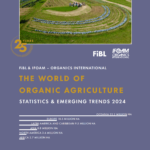
40 downloads
Title of document: The World of Organic Agriculture Statistics & Emerging Trends 2024 Authors/editor: Helga Willer, Jan Trávníček and Bernhard Schlatter Journal’s name if any: Ministry/Government Agency/Organization: FiBL & IFOAM – ORGANICS INTERNATIONAL Year of publication: 2024 Geographic focus: Global level Main issues/ topics addressed (for example: Organic Agriculture Worldwide: Current Statistics; Global Market For Organic Food And Drink; Standards And Regulations Policy Support…) School of agroecology (if any): Web address to original document (if any): https://www.fibl.org/en/shop-en/1747-organic-world-2024 Summary: Organic agriculture is practised in 188 countries, and more than 96 million hectares of agricultural land are managed organically by at least 4.5 million farmers. Global sales of organic food and drink reached almost 135 billion euros in 2022. The 25th edition of "The World of Organic Agriculture", published by the Research Institute of Organic Agriculture FiBL and IFOAM – Organics International, offers a comprehensive review of recent developments in global organic agriculture. It presents detailed statistics on organic farming that relate to area under organic management, land use and crops, the number of farms and other operator types, retail sales and international trade data. The book includes contributions from representatives of the organic sector from around the world about the global market for organic food, organic imports, regulations and policies. It offers insights into current and emerging trends in organic agriculture in Africa, Asia, Europe, Latin America, North America, and Oceania and reports on several countries. Read More
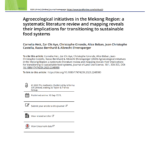
12 downloads
Title of document: Agroecological initiatives in the Mekong Region: a systematic literature review and mapping reveals their implications for transitioning to sustainable food systems Authors/editor: Cornelia Hett, Zar Chi Aye, Christophe Gironde, Alice Beban, Jean-Christophe Castella, Rasso Bernhard & Albrecht Ehrensperger Journal’s name if any: Journal of Land Use Science Ministry/Government Agency/Organization: © 2023 The Author(s). Published by Informa UK Limited, trading as Taylor & Francis Group. Year of publication: 2023 Geographic focus: Mekong regional Main issues/ topics addressed (for example:) School of agroecology (if any): Web address to original document (if any): https://doi.org/10.1080/1747423X.2023.2248980 Summary: This article provides a comprehensive overview of agroecological initiatives in the region, including their geographical distribution, focus areas, and potential for scaling up. It also highlights some of the challenges and opportunities associated with transitioning to more sustainable food systems Read More
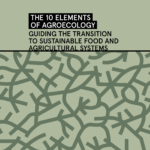
10 downloads
Title of document: The 10 Elements of Agroecology: Guiding the transition to sustainable food and agricultural systems Authors/editor: FAO Journal’s name if any: Ministry/Government Agency/Organization: FAO Year of publication: 2018 Geographic focus: Global Main issues/ topics addressed (for example:) School of agroecology (if any): Web address to original document (if any): Summary: Today’s food and agricultural systems have succeeded in supplying large volumes of food to global markets. However, high-external input, resource-intensive agricultural systems have caused massive deforestation, water scarcities, biodiversity loss, soil depletion and high levels of greenhouse gas emissions. Despite significant progress in recent times, hunger and extreme poverty persist as critical global challenges. Even where poverty has been reduced, pervasive inequalities remain, hindering poverty eradication. Integral to FAO’s Common Vision for Sustainable Food and Agriculture, agroecology is a key part of the global response to this climate of instability, offering a unique approach to meeting significant increases in our food needs of the future while ensuring no one is left behind. Agroecology is an integrated approach that simultaneously applies ecological and social concepts and principles to the design and management of food and agricultural systems. It seeks to optimize the interactions between plants, animals, humans and the environment while taking into consideration the social aspects that need to be addressed for a sustainable and fair food system. Agroecology is not a new invention. It can be identified in scientific literature since the 1920s, and has found expression in family farmers’ practices, in grassroots social movements for sustainability and the public policies of various countries around the world. More recently, agroecology has entered the discourse of international and UN institutions. Read More
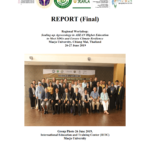
16 downloads
Title of document: Regional Workshop: Scaling-up Agroecology in ASEAN Higher Education to Meet SDGs and Ensure Climate Resilience Maejo University, Chiang Mai, Thailand Authors/editor: MU Journal’s name if any: Ministry/Government Agency/Organization: CU, OHEC, MU, SEARCA, UNESCO, ALiSEA Year of publication: 2019 Geographic focus: ASEAN Main issues/ topics addressed (for example: …) School of agroecology (if any): Web address to original document (if any): Summary: As part of CU’s policy studies and dialogue project Maejo University (MJU) during 26-27 June, 2019 hosted a regional workshop in Chiang Mai on Scaling-up Agroecology in ASEAN Higher Education to meet SDGs and Ensure Climate Resilience” in partnership with CU and ASEAN Agriculture Universities Network (AAUN). This is the full report of Regional Workshop: Scaling-up Agroecology in ASEAN Higher Education to Meet SDGs and Ensure Climate Resilience Maejo University, Chiang Mai, Thailand, 26-27 June 2019 Read More
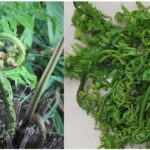
42 downloads
Title of document: Production of Vegetable Fern (Diplazium esculentum Reytz.) Under Varying Levels of Shade Authors/editor: Patrick Trail, Yuwadee Danmalidoi, Abram Bicksler, and Rick Burnette Journal’s name if any: EDN Ministry/Government Agency/Organization: ECHO Asia Impact Center Year of publication: 2021 Geographic focus: Asia Main issues/ topics addressed (for example: …) School of agroecology (if any): Web address to original document (if any): http://edn.link/hk96zz Summary: This topic of interest dates back a few years to when Rick Burnette served as Director of ECHO Asia. Observing that local edible vegetable ferns were only being wild-harvested and made available at market certain times of the year, he rationalized that perhaps this local Neglected and Underutilized Species could be cultivated on-farm, using artificial shade, thus making it marketable in the ‘off-season’ as well. Since that time, the experiment has been replicated and wrapped up (with the help of many hands), and the following article summarizes what we have learned Read More
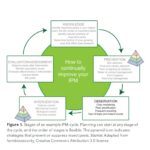
27 downloads
Title of document: Insect Pest Management Authors/editor: Annie Deutsch and Stacy Swartz Journal’s name if any: Ministry/Government Agency/Organization: EDN Year of publication: 2021 Geographic focus: Asia Main issues/ topics addressed (for example: …) School of agroecology (if any): Web address to original document (if any): http://edn.link/ipm2 Summary: Insect pests affect all forms of agricultural production, from densely planted field crops to high-value nursery plants to grains in storage. This article explains some principles and practices for conducting in-field observations (sampling) to inform pest management decisions. General principles and practices are discussed for detecting, identifying, and monitoring pest populations, in order to inform next steps. Read More
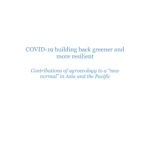
10 downloads
Title of document: COVID-19 building back greener and more resilient: Contributions of agroecology to a “new normal” in Asia and the Pacific Authors/editor: FAO Journal’s name if any: Ministry/Government Agency/Organization: FAO Year of publication: 2021 Geographic focus: SEA Main issues/ topics addressed (for example:…) School of agroecology (if any): Web address to original document (if any): http://www.fao.org/documents/card/en/c/cb3114en Summary: Besides the severe health crisis, the COVID-19 epidemic also caused the global economy to contract at a rate not seen since the Second World War and led to a severe increase of poor and food insecure people as well as a sharp projected decrease of production of agricultural goods in Southeast Asia. The effects of the pandemic on agriculture have been exacerbated by the way in which the current industrial farming system is set up. Integral to Food and Agriculture Organization’s (FAO) common vision for sustainable food and agriculture, agroecology echoes the goals of the 2030 Agenda and can be seen as a key part of the global response to this climate of instability, offering an original approach to meeting significant increases in our food needs of the future while ensuring no one is left behind. As recognized by the World Bank and FAO-led global agriculture assessment (IAASTD 2019), landmark reports from IPBES (2018; 2019), IPCC (2019), and FAO (2019a), agroecology has the capacity to reconcile the economic, environmental, and social dimensions of sustainability. This paper is a contribution to the regional dialogue on how to respond to the COVID19 crisis. It first highlights some of the impacts of the pandemic on agriculture and food security in the Asia Pacific Region. Then, mobilizing the FAO’s 10 elements of Agroecology framework, it provides selected examples of how agroecological approaches can contribute transforming food systems and developing a greener, more resilient and more inclusive “new normal” Read More
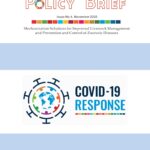
5 downloads
Title of document: Policy Brief - Issue No. 4: Mechanization Solutions for Improved Livestock Management and Prevention and Control of Zoonotic Diseases Authors/editor: UN-ESCAP CSAM Journal’s name if any: Ministry/Government Agency/Organization: UN-ESCAP CSAM Year of publication: 2020 Geographic focus: Asia Main issues/ topics addressed (for example: Role of Mechanization in Prevention and Control of Zoonotic Diseases; Recommendations…) School of agroecology (if any): Web address to original document (if any): http://www.un-csam.org/Publication/PB-2020-03-ENG.pdf Summary: Read More
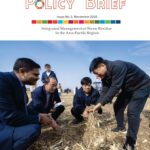
6 downloads
Title of document: Policy Brief - Issue No. 3: Integrated Management of Straw Residue in the Asia-Pacific Region Authors/editor: UN-ESCAP CSAM Journal’s name if any: Ministry/Government Agency/Organization: UN-ESCAP CSAM Year of publication: 2020 Geographic focus: Asia Main issues/ topics addressed (for example: Impact of the Pandemic on Agriculture in the Asia-Pacific Region; Role of sustainable agricultural mechanization in supporting recovery and building resilience…) School of agroecology (if any): Web address to original document (if any): http://www.un-csam.org/Publication/PB-2020-03.pdf Summary: Burning of straw residue is a common practice in many countries of the Asia-Pacific region. In recent times, this practice has drawn the attention of policymakers and the public due to its adverse effects on the environment, including air pollution which impacts the life of millions of people across countries and contributes to climate change as well as loss of fertility of agricultural land. Appropriate agricultural machinery can help farmers adopt sustainable and integrated management of straw residue including its use as fertilizer, cattle feed, bioenergy, substrate for growing mushrooms and industry material. Read More
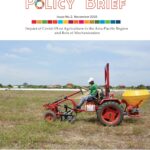
8 downloads
Title of document: Policy Brief - Issue No. 2: Impact of Covid-19 on Agriculture in the Asia-Pacific Region and Role of Mechanization Authors/editor: UN-ESCAP CSAM Journal’s name if any: Ministry/Government Agency/Organization: UN-ESCAP CSAM Year of publication: 2020 Geographic focus: Asia Main issues/ topics addressed (for example: Impact of the Pandemic on Agriculture in the Asia-Pacific Region; Role of sustainable agricultural mechanization in supporting recovery and building resilience…) School of agroecology (if any): Web address to original document (if any): http://www.un-csam.org/Publication/PB-2020-02.pdf Summary: The impact of the coronavirus disease pandemic on the agricultural sector has brought unprecedented challenges in the Asia-Pacific region. At this juncture, it is important to undertake a closer analysis of the effect of the pandemic on agriculture in the region, with particular attention to resource-poor smallholder farmers and low-wage migrant agricultural workers. In addition, it is vital to identify solutions that can help member States ‘build back better’ the agricultural sector. Read More

 Asia & Mekong Region
Asia & Mekong Region  Cambodia
Cambodia  Laos
Laos  Myanmar
Myanmar  Other
Other  Vietnam
Vietnam